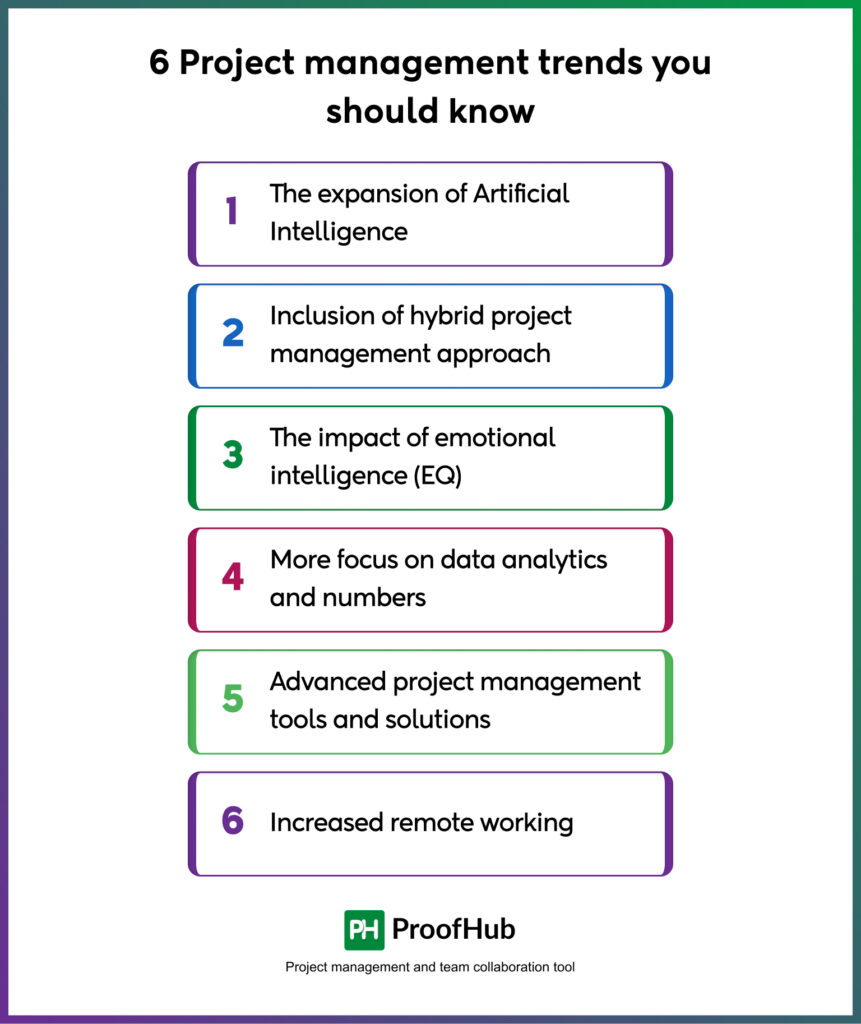Introduction
Just think of what the project management industry looked like ten years ago. Fewer methodologies, fewer tools, smaller teams, and simpler projects. Cut to 2025, and things have changed tremendously as the teams are no longer smaller and the projects are no longer simpler.
As the saying goes, “Change is the only constant.” It seems so true for the project management industry. The project management landscape is changing rapidly with evolving technologies, tools, and the latest trends. And, the change doesn’t seem to slow down.
Let’s cut the chase and take a look at the emerging trends in project management happening all around the world.
6 Project management trends you should know

1. The expansion of Artificial Intelligence (AI) and automation
There is a lot of buzz around artificial intelligence and its implications. Just like software development, aerospace, healthcare, and finance, the impact of artificial intelligence and automation can also be seen and felt in project management.
Impact: Many companies have already started using AI in project management to perform their daily tasks that require human effort through task automation. The effect goes beyond automating simple tasks but is also quite helpful in obtaining performance insights. AI is one of the latest trends in project management, transforming how teams approach problem-solving and decision-making.
Project managers can use automation to perform complex tasks ranging from scheduling to data visualization and make informed decisions based on the captured insights.
What can you do to adapt
First and foremost, project managers should embrace AI in project management and then learn how to leverage it for successful project completion.
Once you’ve learned to leverage AI to automate data, project execution will be much easier than before. It also makes way for building meaningful relationships with your team members and clients.
Let’s see how AI has enabled better risk estimation: We all know how deadlines are pushed ahead either due to bad estimation or unknown external factors.
With artificial intelligence, you can get the right estimation of a project’s duration, costs, and progress helping you predict realistic timelines for your project.
2. Inclusion of hybrid project management approach
Not all projects are equal and not all teams can stick to one specific methodology.
That’s why hybrid project management has been gaining attention and the number of project managers and Scrum masters combining more than one methodology is increasing.
In simple words, hybrid project management refers to methods combining approaches from the traditional PM environment, agile, scrum, and lean to drive project success.
Impact: When you implement the hybrid model, you can bring all your projects, tasks, people, and communications to one place helping you make the right business choices.
For instance, by mixing the traditional approach with the Agile methodology, team members with different views, and working styles can work together for more stability, engagement, and efficiency.
What can you do to adapt
Use discretion to understand which methodology works best for a specific project. Smart project managers are opting for a mix of agile and traditional methodologies to get the best of both worlds.
Tip: We recommend using a traditional approach for simple and clear parts and agile for complex ones while working in a multi-project environment.
3. The impact of emotional intelligence (EQ)
You might be wondering how the ability to understand and recognize emotions has something to do with project success. Well, it does play a vital role.
When TeleSmart took a survey, it was found that 58% of respondents believe that emotional intelligence is one of the strongest predictors of performance irrespective of the nature of your job.
Impact: Managing projects goes beyond defining the scope, making deadlines, and deciding the budget. Project managers have to manage people as well and that means more complications, which requires emotional intelligence and soft skills.
Failing to understand team members’ emotions could lead to a lot of emotional activity in a team. The result isn’t always all hunky-dory.
What can you do to adapt
To deal with different personalities and ensure project success, a proper understanding of emotions (both yours and others) is required – making it a necessary leadership skill for project managers all over the globe.
Thus, learning the art of emotions and what drives people is becoming more important than ever to predict project success in the future.
4. More focus on data analytics and numbers
Project management involves a lot of data. Project managers are increasingly leveraging data insights to make informed decisions to handle projects better and increase business growth.
Impact: Whether it’s project planning, quality management, or risk estimation, the use of big data and data analysis has already started shaping the project management world. The collected data is useful for learning how to form teams, the size of a team, how to include and position team members, and the skill sets needed to manage projects better.
What can you do to adapt
The smart and wise ones leverage technological advancements to stay relevant. Data analytics, if used the right way has the power to produce a lot of business value.
“What gets measured, gets managed” — Peter Drucker, management guru
If you’re someone who doesn’t like numbers, find the tools that can do the work for you. Project analytics tools offer strategic parameters that could help you get the complete picture of all project activities. Get high-level data and custom reports with tech tools such as Google Data Studio, and Tableau to visualize data.
5. Advanced project management tools and solutions
In today’s digital era, project management tools have become an indispensable part of project management. It has long been one of the most effective project management trends The numbers tell the same story. According to research, 77 percent of high-performing projects use project management software to plan, execute, and control all aspects of project management.
Impact: Project management tools and solutions have always been the game-changing factor. Below are some ways in which these tools are making positive changes in project management.
- Project planning: Uses data from previous projects to plan better.
- Scheduling and time tracking: Keeps track of time spent on tasks and manages scheduled events, meetings, milestones, and deadlines.
- Communication and collaboration: This lets you share critical information with team members, clients, and stakeholders.
- Budgets and deadlines: Helps you deliver projects within the allocated budget
- Progress tracking: Keeps track of the ongoing projects whether they are on track or not, and if resources need to be adjusted.
What can you do to adapt
It goes without saying that project management tools are of much help to project managers to plan and deliver projects on time. They also give team members a platform to communicate and collaborate in a single place.
How ProofHub helps you keep up with project management trends
Investing in good project management software is the need of the hour. There are a handful of reasons why ProofHub is worthy of being added to your toolkit.
Let’s take a look at them:
- Gives you ultimate control of your projects with custom roles
- Keeps your work organized so that you don’t have to worry about what to do next
- Simplifies task management by letting you create tasks, subtasks, and recurring tasks, assign and share them with team members, clients, and stakeholders
- Provides a visual timeline of tasks, projects, and resources to see who’s doing what
- Clear insights on resource utilization and project progress
- Keeps your files and documents organized
- Let you mention team members for quicker collaboration
- Keeps the account information safe with IP restriction
- Integrates with Google Calendar, iCal, Google Drive Box, Onedrive, Dropbox, and Outlook
We have a lot of features that might interest you and your teams, check all ProofHub features here.
6. Increased remote working
It’s not a new trend, but it is still increasing a large number of professionals preferring to work remotely has sky-rocketed in the last couple of years and the trend is here to stay. According to research by Gallup, “Remote working has been on the rise since 2012: from 39% in 2012 to 43% in 2016. The desire to work remotely is here to stay and it isn’t limited to a few select industries.”
Impact: Remote project management offers many benefits. The first one is more flexibility in the schedule and the second is not having to commute to the office every day. It’s also important to consider investing in tools that can help protect you in a remote-work setup. You can start by checking out the best free antivirus software available online. Project costs are also reduced. Plus, you get an opportunity to work with a diverse talent pool.
What can you do to adapt
To bring out the best in your virtual team, I have penned down some practical tips:
- Weekly or biweekly check-in meetings and calls to know how things are progressing
- Make team members accountable by asking for status updates
- Start using online collaboration tools such as ProofHub to collaborate with team members and stay on top of things
- Hold performance reviews four times a year
What do you anticipate for the future?
Along with these trends, you might observe a considerable rise in millennial project managers, PMOs, and more focus on cybersecurity measures. Paying attention to these latest project management trends can help you lead with success.

